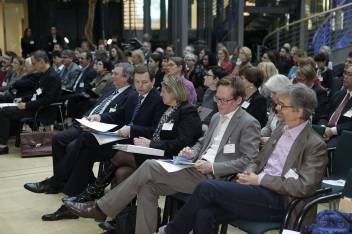 The “Thanks, Otto! 125 years of pensions and new global perspectives” conference is underway!
The “Thanks, Otto! 125 years of pensions and new global perspectives” conference is underway!
After months of preparation, we’re in Berlin over two days to examine the legacy of the world’s first pension and the future of pension systems.
Thanks, Otto! has been organised by HelpAge International and HelpAge Deutschland, the German Federal Ministry for Economic Cooperation and Development (BMZ), GIZ, and Allianz.
Governments, donors, multilateral institutions including the World Bank, civil society and academics, as well as delegates from Africa, Latin America and East Asia are all here.
The conference is addressing important questions:
- What role do pensions play today and what challenges are we facing in the future?
- What is the future of retirement?
- How will we fund pensions in the context of demographic ageing?
- What role can development cooperation play?
Bismarck’s legacy
The conference was opened by Professor Dr Volker Deville of Allianz. He said that building a pension system today should take into account increasing longevity and declining fertility rates. Pension systems built on an alliance between the state, employer and private sectors will also provide a more stable foundation.
The keynote speaker on day one was Thomas Silberhorn, the Parliamentary State Secretary from BMZ.
He stated that a pension system based only on contributions from formal employment is doomed to failure.
He highlighted that pension systems have to be adapted from generation to generation and that any system requires review and modification. Mr Silberhorn added that BMZ would be raising the issue of ageing within the on-going post-2015 process.
Historical context
To set the discussions in context, the conference started by looking at the historical evolution of Bismarck’s pension. Professor Gerhard Ritter of Ludwig Maximillians University provided a fascinating overview of the political, social and economic context in which Bismarck had pushed his idea for an old age pension.
Bismarck’s role in developing the old age pension had started with accident insurance, which was organised through employers’ occupational organisations, and later, insurance for sickness and invalidity.
Prof Ritter highlighted that the old age pension insurance was however a leap into the dark as no one could give a realistic estimate of the cost involved or its expected impacts.
He said that Bismarck proposed to fund the accident and pension insurance through the introduction of a tobacco monopoly. This would fund an old age pension for the so-called “have-nots” in society, whilst workers on higher incomes would contribute to the system.
Overall it would act as a system of solidarity for all citizens.
Prof Ritter highlighted that one of the objectives of Bismarck’s proposal was for even the poorest German to be able to retain a sense of dignity in older age.
Bismarck’s proposal to fund the old age pension from the tobacco monopoly was unfortunately rejected, which led to the development of a model based on contributions from employers and employees.
Sustainability, adequacy, coverage
In the first panel discussion, Robert Palacios from the World Bank highlighted the importance of paying attention to the history of pension systems. Learning from what has come before is critical for developing what should come next.
He said that in the last five years, contributory pensions have become more financially sustainable.
As a result of reforms, many countries are now spending less on pensions than they were in 1994.
Mr Palacios said that although the financial sustainability problem was less pronounced today, most workers are still not covered and it was becoming more difficult to rely on people to pay into the contributory system.
He added that the race between ageing and pensions coverage would be lost if you wait for traditional contributory pension systems to catch up. Pensions financed from general tax revenue were part of the answer, he said, recalling Bismarck’s original proposal to fund from the tobacco monopoly.
Dr Katja Hujo from UNRISD viewed that the Bismarck system had received criticism from both ends of the political spectrum, but there was still value in the Bismarck system today – although it is an ambitious model.
Historically, she said that the 1990s had seen a wave of privatisation of pension systems, whilst the 2000s were seeing the expansion of social pensions, and that many pension systems were evolving in to more hybrid models.
The panel also touched upon the issue of adequacy. Dr Hujo stressed that the view of adequacy depended on whether it is simply for poverty alleviation or the continuation of some standard of living.
Prof Ritter added that countries can start with a minimum amount for poverty alleviation and then gradually increase it to maintain a standard of living, also building voluntary contributions on top of the minimum.
Get involved!
There are a lot more discussions to come:
- Download a special edition of Project M magazine on 125 years of pensions.
- Download the Berlin communiqué.
- Download the list of participants.
- Check out our photo gallery.
- Download the presentations.
